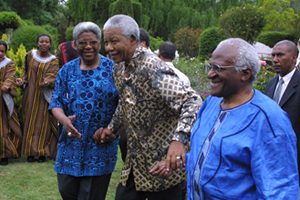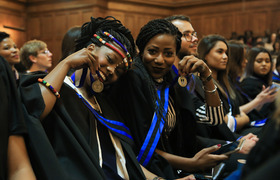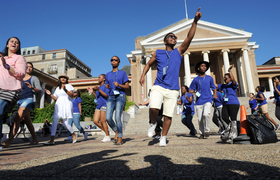Filling the shoes of the fisherman...
11 December 2013
By Chair of Council, Archbishop Emeritus Njongonkulu Ndungane
I often say that Robben Island Maximum Security Prison was the university of the world in which I majored in humanities. There I learnt about the indomitable human spirit, empowered by the Spirit of the Living God. It was also there that I felt the hand of God upon me and the call to be his priest. For Nelson Rolihlahla Mandela it was the place where he displayed the mark of leadership that, nearly three decades later, would have him presiding over an established constitutional democracy that also allowed for academic freedom and freedom of speech. We shared a solidarity through our shared vision of a better life for all South Africans. We had an unshakeable faith in the God of Freedom, the God of Justice, the God of Hope, who touched our world of sad oppression with his healing breath.
Einstein said that coincidences are God's way of remaining anonymous. I would like to share with you a montage of coincidences, with the year 1963 as the common denominator.
In 1963, a time when the world was experiencing the consequences of the Cold War and the fear of a nuclear holocaust, Australian novelist and playwright Morris West wrote the prophetic book The Shoes of the Fisherman, about a protagonist unexpectedly set free after 20 years in a Siberian labour camp who goes on to be elected Pope. Literary critics said that the story lacked a major plotline, yet even at its darkest, the book maintained faith in humanity.
In the same year, a time when South Africa was experiencing intensified forms of militant struggle and urban uprisings based on an uncompromising demand for universal franchise, Nelson Mandela was arrested and tried for 221 acts of sabotage in what became known as the Rivonia Trial, a trial that would last for two years and seal his fate as a political prisoner for 27 years. Yet even at the trial's darkest hour, Mandela maintained his faith in justice: "I have cherished the ideal of a democratic and free society in which all persons live together in harmony and with equal opportunities."
West's story centres around the Catholic Church, and in particular, the Papacy. He sees the pontiff as an earnest human being constrained by the inflexible traditions and bureaucracy of the Vatican, and the reader admires him for his willingness to carry the burden.
Mandela's story centres around inequality in South Africa where the majority of its 'citizens' were constrained by the inflexible laws of the apartheid government, and the world admired him for his willingness to carry our burden.
The 1968 award-winning film The Shoes of the Fisherman was based on Morris West's epic novel. The main character in the film bears remarkably strong similarities to the real character of Mandela. The finale portrays the pontiff (Anthony Quinn) standing on the balcony of the Vatican in front of a crowd of thousands on St Peter's Square. He removes his mitre and says: "I stand before you bare-headed because I am your servant. We are in a time of crisis. I cannot change the world. I cannot change what history has already written. I can only change myself, and begin with unsure hands to write a new chapter... I am the custodian of the wealth of the Church. I pledge now all our money, all our holdings in land, buildings, and great works of art for the relief of our hungry brothers... I beg the great of the world and the small of the world to share out their abundance with those who have nothing." The scene ends with resounding applause from the crowds amid loud chanting and waving of flags.
In February 1990, more than 50,000 people gathered on the Grand Parade in Cape Town to witness the newly-released Mkhulu as he stepped onto the balcony of the City Hall and addressed the crowds: "I stand before you not as a prophet but as a humble servant of you, the people. Your tireless and heroic sacrifices have made it possible for me to be here today. I therefore place the remaining years of my life in your hands... I am convinced that your pain and suffering was far greater than my own... The fabric of family life of millions of my people has been shattered. Millions are homeless and unemployed. We call on our white compatriots to join us in the shaping of a new South Africa... We call on the international community to continue the campaign to isolate the apartheid regime..." The crowds cheered and chanted "Amandla!" and there was great jubilation.
Pope John XXIII died on the same day that Morris West's book was published. The Shoes of the Fisherman became the best-selling novel in the US in 1963. Ten years after the release of the film in 1968, a cardinal from a Marxist-dominated country was elected as Pope. It was also the year that Martin Luther King was assassinated. Coincidence, or fate? Chance, or destiny?
 Click to view larger image.
Click to view larger image.
On 21 August 1963, I spent my first night as a convicted inmate reflecting on the words that Mangaliso Robert Sobukwe had underlined as the basis for the greatest cause on earth, the liberation of humanity: SERVICE. SACRIFICE. SUFFERING.
The next day I was transported to the country's maximum security prison, Robben Island, and thus began my education for life, in leg irons, handcuffed. My claim to fame is that, on Robben Island, I built the cell in which Mandela would later be incarcerated. He was a father figure, a leader, to many, many of the prisoners on Robben Island; a towering presence, a rock against whom the others leaned. His own service, sacrifice and suffering in his unflinching commitment to justice inspired younger generations in terms of nobility, fighting for basic human rights; and in terms of tenacity, not succumbing to the dehumanising efforts of the prison warders.
Born in Mvezo alongside the meandering Mbashe River, Mandela grew up in a royal Xhosa household and attended the elite Methodist school Healdtown, which was modelled on the English education system. He was part of that long line of intellectuals and distinguished leaders who attended the mission schools and influenced history and political life profoundly. As Professor André Odendaal articulated in his seminal book The Founders, "These examples are proof of the depth and resilience of the political and intellectual traditions attached to the earliest activists, who laid the foundations for the freedom struggle in South Africa. These traditions, together with the accompanying intellectual capital, survived for generations in durable and deep-rooted networks, through multiple transitions and adaptations, to impact on the present." Mandela is one of my most revered heroes. We shared a commitment to the role of civil society in holding governments accountable to fulfil commitments on democratic governance and to deliver on pledges on aid, trade and development. We were both deeply committed to public service, to which we dedicated our lives. We have both spoken out on issues, of HIV and AIDS, gender discrimination, and reconciliation and forgiveness. As coincidence would have it, Mandela was the first elected President and I was the first elected Archbishop in the new dispensation, and so we would collaborate in addressing the challenges and deepening our new democracy. On occasion he would phone me and ask: "Njongonkulu, my leader, what are you doing for breakfast tomorrow?" and then we would talk about issues. There was always an openness to engage and work together.
At one of our breakfast meetings I shared a story of my travels abroad during the time of the Free Mandela campaign. I was addressing young 11- and 12-year-olds at a primary school in Switzerland, and I asked them: "Who can tell me the first name of Mandela?" To which they all responded proudly in unison: "Release!". Such was the fervour of the campaign internationally!
I recall a time during his presidency when I was invited to Germany to meet with representatives of the church, industry and politics. I was staying at a convent just outside Bonn, and though the sisters were hospitable, I was not spared from sharing in their very frugal domestic lifestyle. At the end of the busy days I longed to relax with a glass of the nectar of the vine, but none was forthcoming in the cold convent. Until one day I was called to the telephone, and I revealed to my hosts that the caller was from South Africa, and was none other than Madiba himself. "If this man is receiving calls from Nelson Mandela, then he must be very important!" - and immediately the sisters' hospitality turned into kindness. How quickly the warmth raced through the corridors of the convent!
Mandela embodied a quasi-religious 'prophetic' leadership that in 1994 eventually freed his people from the bondage of apartheid. The Prophet, political or religious, is a revolutionary - that is, one who prophesises a better future, the attainment of which requires the radical transformation of the present. The Prophet is a political agent, but is also a moral agent - a political-religious man. Mandela's struggle for South Africa's liberation embraced this definition of prophetic rule, as the charismatic icon of the ANC liberation movement was able to build up and maintain a devoted following even through he was almost three decades in jail.
Mandela's presidency between 1994 and 1999 could also be seen in prophetic terms, as he sought to reconcile a deeply divided society and to point his 48 million disciples to a better future. His rule represented prophetic nation-building. An example of his insightfulness was when he stepped onto the field at Ellis Park in 1995 wearing the No. 6 Springbok jersey, and said: "The Boks belong to all of us now." He used sport as a catalyst to unite blacks and whites, and in return he was rewarded with the Rugby World Cup that year.
Nelson Mandela is the most well-known historical figure in African history. He has countless books, documentaries and monuments devoted to him, and universities and streets named after him. He sought peaceful means for conflict resolution and regional co-operation and integration. Nelson Mandela is an icon and globally recognised symbol of his country's freedom. It is critical that his prophetic legacy is preserved.
Lala ngoxolo noloyiso Tata. AH Dalibhunga!!!
 This work is licensed under a Creative Commons Attribution-NoDerivatives 4.0 International License.
This work is licensed under a Creative Commons Attribution-NoDerivatives 4.0 International License.
Please view the republishing articles page for more information.










